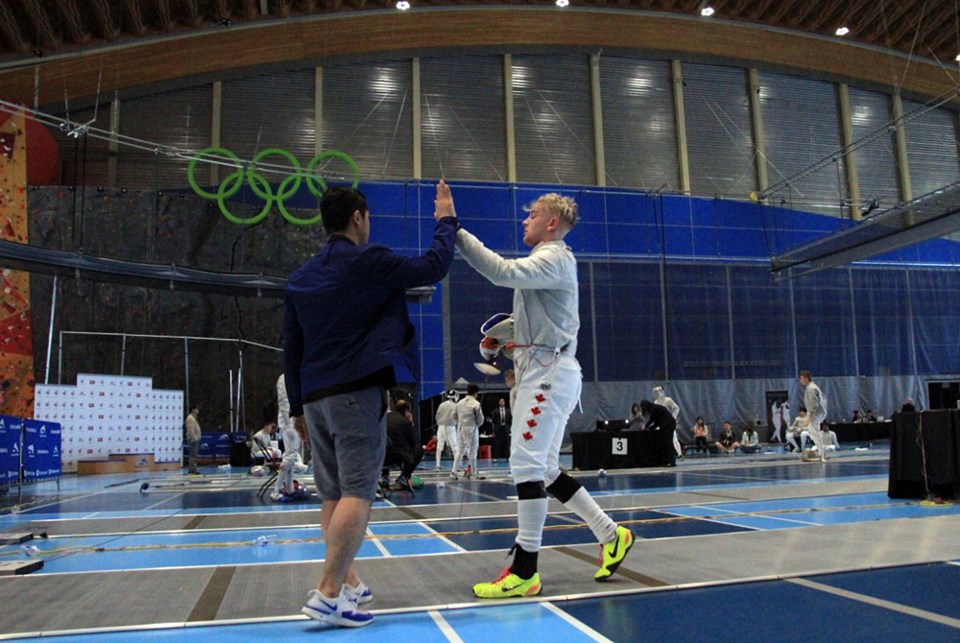Thomas Greenwood was on track to compete for Canada at the 2024 Summer Olympics in Paris — until the COVID-19 pandemic derailed his training, all competitions and possibly his fencing career.
At 18 years old, the Pitt Meadows resident, who trains at Antaean Fencing in Port Moody, is already looking at the past year as what could have been and pondering what the global health crisis might cost him.
He’s not alone.
A recent study released by the Canada Games Council (CGC) says one in three Canadian youth between the ages of 13 and 24 are unsure if they’ll return to playing the sport they love once the pandemic is in the past, and one in five says they have no intention to return to their sport.
“This concerning data suggests that our sport community needs to do everything we can to support the long-term welfare of Canadian youth, by remaining engaged in sport,” said the president and CEO of the CGC, Dan Wilcock, in a press release.
Greenwood, who started fencing when he was 13 because his mom didn’t like standing in the cold watching him play field lacrosse in Coquitlam, was named to Canada’s U17 world team in 2019. He trained at Antaean’s facility on Spring Street twice a day, attended specialized high-performance camps in Hong Kong and Korea, competed in Poland, France, Colombia and across the United States.
But when the pandemic spread around the world in early 2020, all of that shut down.
Even Greenwood’s ability to stay sharp by working out on his own went away because fencing requires an opponent with whom to practise the sport’s thrusts and parries, and hone its complex mental strategies.
“It’s been really strange,” he said of the pause in his athletic aspirations that’s now stretched beyond a year. “It’s one of those things that been a big part of my life, and now it’s taken a back seat.”
Uncertain about whether he’ll be able to make up for lost time and get back to a level that will allow him to compete internationally again, Greenwood said he’s at a turning point. Government support for fencing is minimal, and with no prospect of a big-money professional career like a top junior hockey player he has to consider when it’s time to get on with his life.
That sense of dislocation from the sport isn’t confined to top-level athletes.
Garrett Ungaro, the president of the Coquitlam Adanacs minor lacrosse association, said registration for this season is down more than 10% as parents and players face the prospect of a second summer without competitive games.
“It’s sad because we use minor sports to engage with kids, give them a sense of community and purpose, and we lost that this past year,” he said, adding coaches are challenged to maintain the kids’ attention with just practice and no games to reward their hard work.
Martin Tilt, the vice-president of Coquitlam Minor Softball who also coaches, said many of the sport’s local leagues are struggling to get registrations back to pre-pandemic levels.
Softball was one of the first minor sports to lose its competitive season locally when the pandemic first hit in March 2020, and then implement procedures for a safe return to practices last June.
But a second season without games is proving a challenge, Tilt said.
“As a coach, it has been tough to answer the inevitable question they have almost every practice, ‘When are we going to play a game?’” he said. “My response of, ‘Just as soon as they let us,’ is starting to sound a bit stale.”
Still, Tilt said, registration amongst softball’s younger players, between the ages of six and 10, is actually up this year.
With the sport played outdoors and little need for physical contact, “parents see softball as a ‘safe’ option,” Tilt said. “Kids are just happy to get outside, see their friends, get some exercise, have some fun, and be part of a team.”
But for high-level athletes like Greenwood, a lot more is at stake than getting exercise and having fun.
“I’m not used to being home all the time,” he said of missing the routines that come from training and having a set schedule with fencing at its core.
Instead, Greenwood is focussing his energy on learning to become an electrician with IBEW in Port Coquitlam, a commitment that may not necessarily mesh with the demands of his sport when restrictions ease. For now, he lives in limbo, a fencer who’s not fencing.
“I hope I’ll be able to step back into the sport again,” he said. “But it’s one of those things that’s such a process, I don’t know if I’ll want to put my life on pause to pursue that.”




